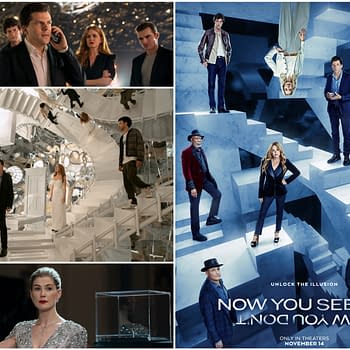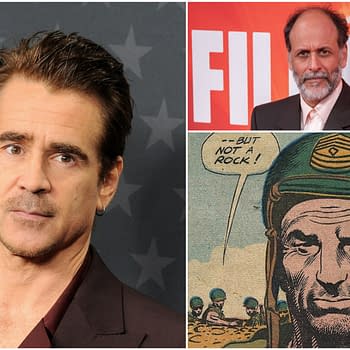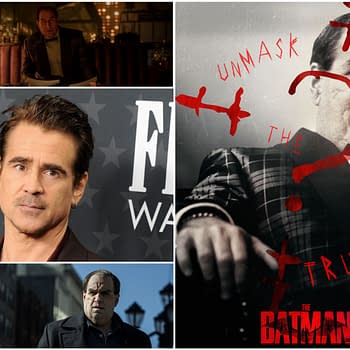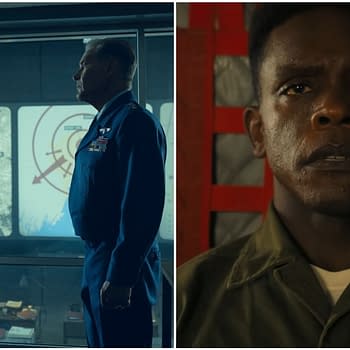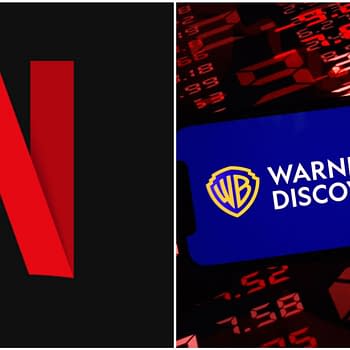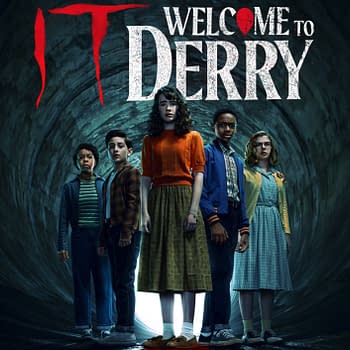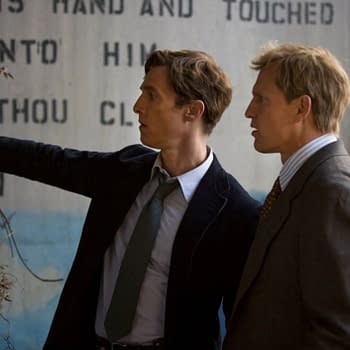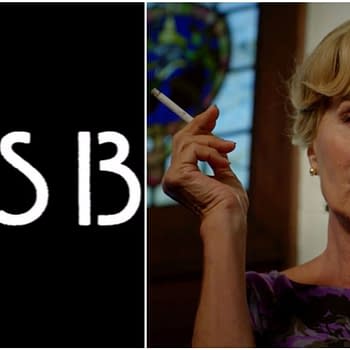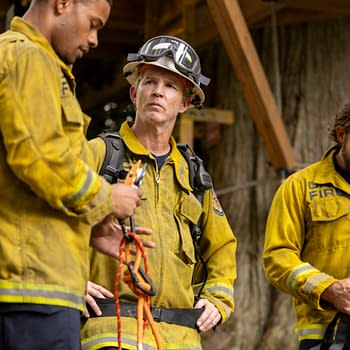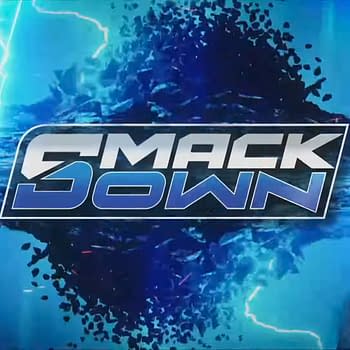Posted in: Kaitlyn Booth, Movies, Review, TV | Tagged: agents of s.h.e.i.l.d., agents of shield, film, marvel, Review, tv
Agents Of S.H.I.E.L.D. Season 4 Reviewed: The Most Consistent And Enjoyable Season Thus Far

Showrunner: Maurissa Tancharoen, Jed Whedon, and Joss Whedon
Summary: The missions of the Strategic Homeland Intervention, Enforcement and Logistics Division.
Warning: Spoilers up until the end of season three of Agents of S.H.I.E.L.D. There will be minor spoilers for season four, but only in that the three plots will be mentioned and examined but not spoiled entirely.
Marvel's first foray into television didn't get off to the best start. After being killed off in The Avengers, Phil Coulson (Clark Gregg) became a character that people rallied behind. Marvel looked at the character and decided that they could figure out a way to bring him back from the dead. They gave Coulson his own show and brought on a pretty fantastic supporting cast including Melinda May (Ming-Na Wen), Leo Fitz (Iain De Caestecker), Jemma Simmons (Elizabeth Henstridge), Grant Ward (Brett Dalton), and the mysterious Skye (Chloe Bennett).
While the pilot did very well, the first half of the first season had its issues, and it soon became apparent why: The show had to jog in place for most of that first season until the Hydra reveal in Captain America: The Winter Soldier. The second season was better and came with the added benefit of bringing the Inhumans to the Marvel universe, but it also stumbled — that season was more about the back half than the front. Season three was also inconsistent. That being said, they did allow Skye, who was revealed to be Marvel superhero Quake (AKA Daisy Johnson), really become a hero in her own. But there were still issues; the show couldn't seem to stick the landing.

Robbie, based on the third version of Ghost Rider, turned out to be the shot in the arm the show needed. It brought in a whole new set of mythology, and Luna really turned the role into something special. The interactions he had with Daisy were great, but the character motivations displayed in his origin episode is some of the best television of the 2016-2017 year. Ghost Rider is a brutal character, and the show's new timeslot of 10 p.m. allowed it to crank up the violence and the blood to an acceptable level that felt like they were doing Robbie justice. Robbie's story also dropped some huge implications about other characters that could be running around the Marvel Cinematic Universe. A tight story told over the first few episodes meant when the show went on its winter break, it could essentially start over with a new central theme — which it did.

The concept of what it means to be human begins to come closer to the surface as the Inhuman hate groups jump to the forefront of the plot. Jansen is fantastic in the role of AIDA; she manages to walk the line of the uncanny valley perfectly, while also making it very apparent that she is much more dangerous than everyone thinks she is. Radcliffe's motivations, and even those of the Inhuman hate groups, make sense on a very human level — which means you might not relate to them, but you understand where they're coming from. The hate groups might hope our lead character dies, but they do it out of fear, and there's no emotion more human than fear. Another tight story more or less wrapped up in seven episodes until the show comes back from its third hiatus.

Agents of HYDRA, as the tagline renamed the show, involved various character in a virtual reality called the Framework. It's like the Matrix, only each person inside had one regret from their life reversed. Two members of the team knowingly enter into the Framework to wake up the rest of the team that had been trapped in this reality when they were switched with LMDs. It once again means that the various actors are going through decathlons; but to highlight who is the best would be a spoiler. The idea of the Framework is fun, and seeing a world where Hydra won is interesting. It lets us see a world turned upside and messes with our perceptions of the characters, while also bringing back a few long-dead ones. It was a good arc that tied up nicely in five episodes, leaving two left to wrap everything up.
The final two episodes feature a seamless conversion of all three plot lines from the season and wrapping everything up in a very satisfying way. While these three stories were all solid in their own right, to see the way they come together is the kind of long-form storytelling that we just don't get in television enough anymore. It also meant that the show was able to keep the pace up, because they had fewer than eight episodes to tell a story. One of the things that hurt the previous seasons of Agents of S.H.I.E.L.D. was that there tended to be a lot of filler. There are very few shows out there that need the 22-episode orders they get, which means the shows with 13 or fewer episodes tend to be tighter story-wise. Agents of S.H.I.E.L.D., which suffered from filler episodes more than other shows, really came into its own when they had to wrap everything up quickly.
That's not to say that the season is completely perfect. The Inhuman resistance plot runs through the first two arcs, but pretty much vanishes halfway through the season. There are story reasons for that, but it feels like a loose thread that was left hanging. Then again, perhaps this is to tie in with Marvel's Inhumans, which is slated to debut later this year. There's also the fact that the final episode came off as a little anticlimactic; but the character beats during it are pretty much solid gold, so you can overlook it. The show also might as well be in its own universe at this point. Aside from a few mentions of the Sokovia Accords and a mention about what team Captain America ends up on, Agents of S.H.I.E.L.D. remains the black sheep of the Marvel universe. This is really a shame, because the show really deserves more recognition than it gets.

The rest of the cast does extremely well, too. In the latter half of the season, it's Iain De Caestecker and Elizabeth Henstridge who pull out all the stops. They both have to go to some very dark, emotional places, and for two characters that started off as a funny little science team, the two of them have quickly become the heart of the show. Henry Simmons as Alphonso "Mack" Mackenzie, who came on as a full cast member this season, was a bright light in a dark room for the first half of the season, but the final episodes of this season lead him to some very intense places. Simmons went there without missing a beat, backed up by Natalia Cordova-Buckley as Inhuman Elena "Yo-Yo" Rodriguez. Jason O'Mara is also very good as new Inhuman leader of S.H.I.E.L.D., playing a character that only gets more interesting the more we learn about him. Chloe Bennet continues to evolve as an actress, turning Daisy into even more of a leader than Coulson. Clark Gregg and Ming-Na Wen are always good, and the quiet moments between the two of them were welcome additions to the chaos of the season.
Agents of S.H.I.E.L.D. had its best season to date, and we can hope that going forward, the creators understand why this season worked as well as it did. Despite a few missteps along the way, they were minor compared to everything else that was going on. The show ended with a killer of a premise for next season, so where the show decides to go from here is anyone's guess. This is the Marvel universe after all; the sky's the limit.









